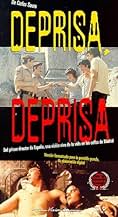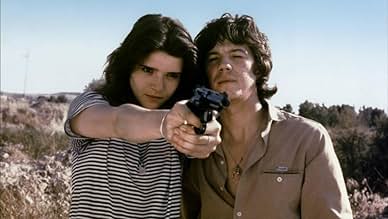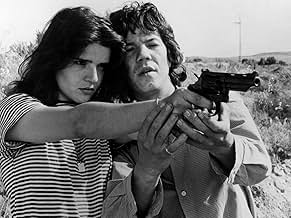Deprisa, deprisa
- 1981
- 1h 39min
CALIFICACIÓN DE IMDb
7.0/10
1.9 k
TU CALIFICACIÓN
Angela empieza a pasar tiempo con Pablo y su banda de ladrones.Angela empieza a pasar tiempo con Pablo y su banda de ladrones.Angela empieza a pasar tiempo con Pablo y su banda de ladrones.
- Premios
- 1 premio ganado y 1 nominación en total
Fotos
Berta Socuéllamos
- Ángela
- (as Berta Socuellamos)
Jose Antonio Valdelomar González
- Pablo
- (as Jose Antonio Valdelomar)
Jesús Arias
- Meca
- (as Jesus Arias)
José María Hervás Roldán
- Sebas
- (as Jose Mª Hervas)
María del Mar Serrano
- María
- (as Maria del Mar Serrano)
André Falcon
- Cajero
- (as Andre Falcon)
Yves Barsacq
- Luis
- (as Ives Barsacq)
Joaquín Escola
- Doctor
- (as Joaquin Escola)
Matías Prats
- Locutor
- (as Matias Prats)
- Dirección
- Guionista
- Todo el elenco y el equipo
- Producción, taquilla y más en IMDbPro
Argumento
¿Sabías que…?
- TriviaJose Antonio Valdelomar González (Pablo) was recruited by Carlos Saura in a casting for non-professional actors. He was paid US$3,000. In 1992 he was found dead of a heroin overdose at Carabanchel prison (Madrid), where he was arrested for robbing a bank.
- ConexionesFeatured in Caso cerrado (1985)
Opinión destacada
This film made such a deep impression upon me that I was sure to view it a second time before it disappeared from tcm "on demand" for an indefinite period of time. Who knows for how long? I may even watch it a third time before its one week run expires at midnight tonight.
In some ways, this film reminds me of notable American films depicting crime sprees, such as "Badlands" or "Gun Crazy", but it is uniquely Spanish in nature and truly stands on its own as a distinctive work of art. Carlos Saura, a director with whom I was totally unfamiliar before a recent tcm double feature of two of his films, is to be commended for an outstanding film that captures a very special atmosphere and tone.
I travelled in Spain, including Madrid, for a month at the end of 1971 when Francisco Franco still ruled the country with a strong arm, including an intricate network of secret police that was not unlike totalitarian regimes everywhere else throughout history. It is very significant that this film was produced after the death of Franco because the Spain that is depicted in this movie seems like a very different country than the Spain that I visited in 1971. While the police in the film are tough enough, they were most likely a much more formidable force during Franco's iron rule.
The use by Saura of the speeding trains outside the balcony of the flat used by the gang as its headquarters is brilliant as they symbolize a society that doesn't even pause for a moment to consider the existence of this totally alienated group until it draws attention to itself by breaking the law, sometimes in extremely violent ways. I could have been riding on one of those trains as a foreign tourist, totally unaware of the existence of this element as it was kicked to the curb of Spanish civilization. Note the shocked, disgusted reaction of the two older, established women when they are suddenly confronted by the disrespect displayed by the delinquent group at the holy site.
The strong flamenco influence of the gypsy rumba music played in the background throughout the film also creates a uniquely delicious Spanish flavor to the film. The musical score powerfully contributes to the overall impact, which is no less than magical and hypnotic for me. The use of amateur actors is another stroke of genius by the director as it makes the action all the more real and believable, not unlike the post World War II Italian films of Vittorio De Sica which I also love.
Did anyone expect the "respectable" doctor to return, as he had promised, after he took Angela's money? And what was to become of Angela after she walked into the darkness at the end? I very much wanted to know. From the very start, the genius of Carlos Saura sustained my interest and involvement to the bitter end. This is a great and much under-rated movie!
In some ways, this film reminds me of notable American films depicting crime sprees, such as "Badlands" or "Gun Crazy", but it is uniquely Spanish in nature and truly stands on its own as a distinctive work of art. Carlos Saura, a director with whom I was totally unfamiliar before a recent tcm double feature of two of his films, is to be commended for an outstanding film that captures a very special atmosphere and tone.
I travelled in Spain, including Madrid, for a month at the end of 1971 when Francisco Franco still ruled the country with a strong arm, including an intricate network of secret police that was not unlike totalitarian regimes everywhere else throughout history. It is very significant that this film was produced after the death of Franco because the Spain that is depicted in this movie seems like a very different country than the Spain that I visited in 1971. While the police in the film are tough enough, they were most likely a much more formidable force during Franco's iron rule.
The use by Saura of the speeding trains outside the balcony of the flat used by the gang as its headquarters is brilliant as they symbolize a society that doesn't even pause for a moment to consider the existence of this totally alienated group until it draws attention to itself by breaking the law, sometimes in extremely violent ways. I could have been riding on one of those trains as a foreign tourist, totally unaware of the existence of this element as it was kicked to the curb of Spanish civilization. Note the shocked, disgusted reaction of the two older, established women when they are suddenly confronted by the disrespect displayed by the delinquent group at the holy site.
The strong flamenco influence of the gypsy rumba music played in the background throughout the film also creates a uniquely delicious Spanish flavor to the film. The musical score powerfully contributes to the overall impact, which is no less than magical and hypnotic for me. The use of amateur actors is another stroke of genius by the director as it makes the action all the more real and believable, not unlike the post World War II Italian films of Vittorio De Sica which I also love.
Did anyone expect the "respectable" doctor to return, as he had promised, after he took Angela's money? And what was to become of Angela after she walked into the darkness at the end? I very much wanted to know. From the very start, the genius of Carlos Saura sustained my interest and involvement to the bitter end. This is a great and much under-rated movie!
- frankwiener
- 8 jul 2019
- Enlace permanente
Selecciones populares
Inicia sesión para calificar y agrega a la lista de videos para obtener recomendaciones personalizadas
- How long is Deprisa, Deprisa?Con tecnología de Alexa
Detalles
- Fecha de lanzamiento
- Países de origen
- Sitio oficial
- Idioma
- También se conoce como
- Deprisa, Deprisa
- Locaciones de filmación
- Los Escullos, Níjar, Almería, Andalucía, España(Beach exterior scene)
- Productoras
- Ver más créditos de la compañía en IMDbPro
Taquilla
- Presupuesto
- ₧36,000,000 (estimado)
- Total a nivel mundial
- USD 632
Contribuir a esta página
Sugiere una edición o agrega el contenido que falta

Principales brechas de datos
By what name was Deprisa, deprisa (1981) officially released in Canada in English?
Responda
![Ver Trailer [OV]](https://m.media-amazon.com/images/M/MV5BNmFmMTIwM2QtZTQ3Ny00MTBkLWIzOWYtZjUzMDkzYTQzOTdlXkEyXkFqcGdeQXRyYW5zY29kZS13b3JrZmxvdw@@._V1_QL75_UX500_CR0)

















